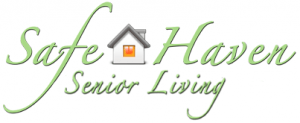At Safe Haven, we specialize in caring for seniors who have been diagnosed with any form of dementia. We understand dealing with a loved one that has a dementia-related diagnosis can be a truly stressful and overwhelming job. Our goal is to assist and make the transition from home to Safe Haven a little easier for you and your loved one.
Our Alzheimer’s care program is not just for our residents but for their families as well. We want our clients’ families to be involved; therefore, we maintain an open door policy.
We have found that in caring for Alzheimer’s/Dementia residents, there are several steps to take in order to provide proper, quality care. Some of the steps we take in order to provide this type of care are finding out the resident’s interests and needs, reading and reviewing their history, talking to family members, and inquiring about their life before dementia. Getting to really know our residents helps us to customize their needs, level of care, and daily activities.
At Safe Haven, we are intentional with planning activities. We want to have fun with our residents and keep them busy, but we also want to engage with them during a time they are most alert and comfortable. We aim to maintain a consistent program at all times to help with their routine.
Further, we believe in our homes you deserve to have their special and specific needs met in a sheltered, low stress environment. Our home is a secure facility so that even agitated residents are protected and cared for safely within the home boundaries. Some of our safety features include protection for wandering residents and an electronic security system that alerts staff of unauthorized exits or entrances.
At Safe Haven, located in the lavish city of Brookhaven, we believe that the task of the caregiver is to view the world through the resident’s eyes and uncover their needs, rather than to try to force the resident to see reason or to orient them to reality. We understand that every person diagnosed with Alzheimer’s or another kind of dementia will have good days and challenging days. We understand that having a staff that is knowledgeable about the psychology of dementia and is trained to redirect the resident who may be experiencing a range of emotions can help to minimize feelings of agitation.
Seniors with a dementia diagnosis experience an increasing inability to remember, reason, solve problems, interpret the environment, and communicate. It is not uncommon for a resident to display abnormal or aggressive behaviors as a means of communicating needs. Understanding why a person is behaving in a particular manner is essential to helping them recover a feeling of well-being. We are not interested in fighting dementia, instead, we allocate our efforts to joining their world.
*Our ultimate aim is to ensure that our residents are receiving well rounded care.
Activities Offered For Residents With Dementia
- Sorting: Residents can practice sorting small objects such as buttons , poker chips, balls, bottle caps, forks, spoons, rocks, etc. as a way to practice cognitive functioning.
- Play dough/Clay: Playing with playdough or clay is a great way to practice fine and gross motor skills.
- Book Making: Creating books from magazine or newspaper articles can help with short term memory and recall.
- What’s in the Bag?: Get a bag and fill it with different items such as cotton balls, sandpaper, leaves, newspaper, felt, q-tips, golf ball, sock, clothespin, etc, then have residents take turns and feel what’s in the bag, and tell you what the items are.
- Stringing: Stringing items such as Cheerios, Fruit Loops, popcorn, or Honeycomb cereal and some string works on fine motor skills and cognitive functioning.
- Cooking Class: Cooking or baking is a way for residents to feel as though they are being purposeful and it keeps their memories sharp. One fun modification is to have them make their own recipe.
- Pet Therapy: Pets are a great way to make residents feel loved and to give them a sense of responsibility. Typically seniors respond well to animals if they are comfortable with them.
- Life skills: Residents can practice life skills such as folding clothes, sweeping, dusting, vacuuming, setting the table and washing windows. These tasks are great for physical activity and also give them a sense of independence.
- Music Appreciation: Music soothes the soul and is known to help with memory recollection, an increased ability to communicate, and recognition of people. Music is also a great tool for getting people to get up and move around.

